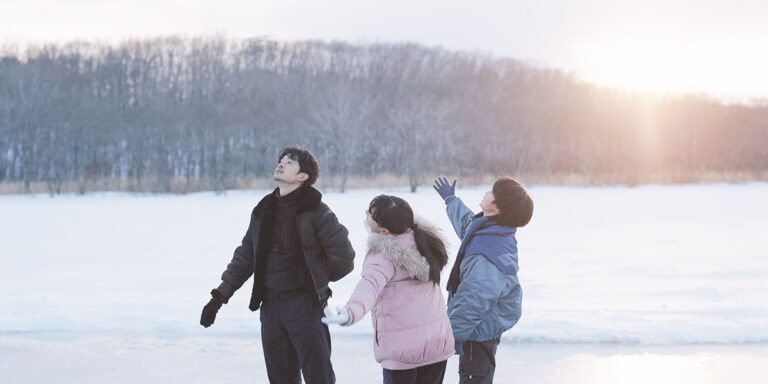
There are many reasons that people might enter the world of sports. Often it’s true talent or the support – or enthusiastic encouragement, however warranted by ability – of a family member, friend, or coach. It can also just be the oldest and most basic motivation of all, to be close to and impress someone else. My Sunshine follows a boy whose eagerness to be around his crush leads to an unexpected transformation from hockey player to figure skater thanks to a determined and affectionate coach.
Takuya (Keitatsu Koshiyama) plays hockey and has a stutter, and he can’t take his eyes off Sakura (Kiara Nakanishi), a figure skater. As he spends time in the vicinity of her coach, Arakawa (Sōsuke Ikematsu), so that he can be closer to Sakura, Takuya becomes Arakawa’s newest pupil, taking the limited skills he has on the ice and turning them into something less sporty and far more artistic. The closeness the two develop doesn’t sit well with Sakura, who feels that Takuya isn’t up to her level, while Arakawa’s boyfriend Igarashi (Ryûya Wakaba) also notices how much attention he is paying to this unexpected student.
My Sunshine comes from filmmaker Hiroshi Okuyama, his second feature film after 2018’s Jesus. Since Okuyama serves multiple roles, acting as director, writer, cinematographer, and editor, it’s clear that this is truly his vision. The setup itself is simple and there aren’t very many characters, but this story feels tight and relevant thanks to the focus of its camera, which spotlights two young people who don’t show what they know in what they say but rather how they move, and the man who can harness their talent and help to shape them into the best athletes and artists they can be.
The effectiveness of this film is very much dependent on the strength of its three lead performers. This is the first film role for both Koshiyama and Nakanishi, and they deliver understated and memorable turns, saying little but evoking much in the way that they dance – or struggle to do so – across the ice. Ikematsu is considerably more seasoned, with a filmography dating back two decades to the Oscar-nominated The Last Samurai. While he speaks much more than his younger counterparts, there’s just as much subtlety and nuance to his turn. Wakaba rounds out the ensemble with a different type of energy, supportive of his partner but not nearly as invested in the future of these two youth. Dialogue is sparse throughout this ninety-minute film, but each of its players makes the little they say count all the more in how they deliver it and address each other.
My Sunshine, which made its debut at the Cannes Film Festival back in May and has since screened at the Toronto International Film Festival and other locations, was also recently released in Japanese cinemas. The way in which its characters conduct themselves and interact reflects Japanese culture but their dynamic has a universality to it that will be recognizable to those involved in competitive sports and who have tried, and potentially failed, to become great in a world that doesn’t always reward effort.
Fortunately, this showcase is much more intimate and doesn’t venture into areas of recruitment or judged arenas, instead remaining focused on these two people indulging a passion that may or may not last as they grow. But, for the time being, it feels real and all-consuming, particularly for the two people looking up to the artist teaching them how to be better. For audiences, the experience should also be affirming and satisfying, visually arresting and emotionally compelling.
Grade: B+
Check out more of Abe Friedtanzer’s articles.
My Sunshine makes its North American premiere in the Centrepiece section at the 2024 Toronto International Film Festival.

